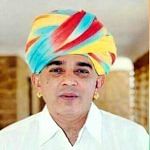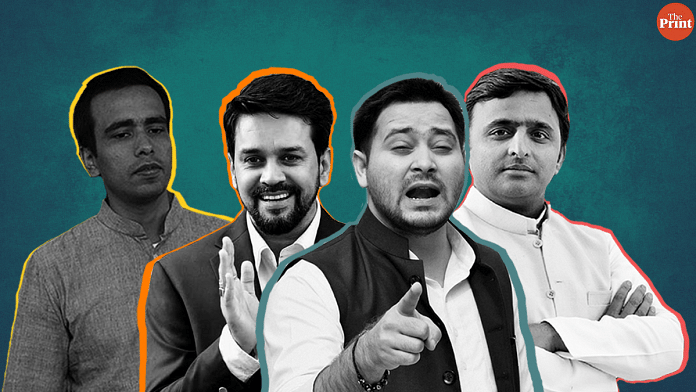At the united opposition rally in Kolkata Saturday, gen-next leaders like Akhilesh Yadav, Tejashwi Yadav and Jayant Chaudhary spoke at length against Narendra Modi and the BJP government. However, issues like jobs and education did not get much attention in their speeches.
ThePrint asks: Do young dynasts appeal to new gen voters or are they also practising outdated politics?
A young dynast leader being voted more than once shows his/her ability to connect with new gen
 Gaurav Gogoi
Gaurav Gogoi
MP, Congress
There is no denying that when a young leader from a dynasty is starting out, there is far more scrutiny and expectation from him/her. Therefore, they must stand by every promise they made before coming to power, because all eyes are on them.
The young leader must also be able to identify certain core issues that their voter base feels strongly about. This could include education, developmental projects, need for more jobs, and speaking up for the community they belong to.
If a young dynasty leader has been voted to power more than once, it shows the leader’s ability to resonate with the aspirations of the new generation.
Coming from a relatively known family does mean that there will be a unique set of expectations from the leader. But we have examples of several young leaders from across parties who have managed to make their mark in politics.
For me personally, it has been an important goal of mine in my political career to speak in Parliament about important issues. These aren’t only issues concerning my state, but I also speak as a policymaker of my country.
This requires taking a cue from other countries and how they have managed to deal with issues such as disaster management, environment preservation and better education policies. A young leader must be able to present a comprehensive view and effectively communicate their ideas.
New gen voters care about performance not ideology, even for dynasts
 Yashwant Deshmukh
Yashwant Deshmukh
Political analyst
The new generation of voters is extremely hands-on and consumerist in their approach. The post-1991 generation understands the language of ire and fire.
They are also very pragmatic and are more likely to vote on the basis of performance and specific deliverables, as opposed to an ideology.
In the case of the previous generation, their E.Q. was far greater than their I.Q. The new generation, however, is low on EQ and isn’t very ideological in nature.
Some might perceive it as an end game for any political dynasty, but that is not the case. The new generation of voters is willing to even give politicians with a dynasty a chance provided they prove themselves.
If Sachin Pilot, Akhilesh Yadav and Jyotiraditya Scindia are willing to hustle and work hard, they will be given a fair chance. They need to prove their mettle without showcasing their surname.
And notice the campaigning of these young leaders — their speeches hardly invoke their family name. It is as if they are consciously trying to avoid leveraging their surnames.
The young dynasty leaders have to run an extra mile to prove they care for the grassroots unlike something that their previous generation had to do. I have never seen Mulayam Singh Yadav go for a 50-km cycle rally.
The new generation of voters also likes it when they see young dynasty leaders as regular people. They celebrate a young dynast who has married out of their caste and religion. When a picture of these young leaders playing with their children is seen, the voters are able to relate to them.
As a dynasty leader, I can’t afford to do anything wrong as it will reflect on my family
 Vikram Randhawa
Vikram Randhawa
MLC, BJP Jammu and Kashmir
Times have changed significantly in Indian politics. A majority of our next-gen voters actively care about politics, and carry great expectations.
Earlier, people would blindly vote for the same person for decades. But now, if you don’t perform well for one term, you will be thrown out. Even for dynasty leaders, surviving for more than one term solely on the basis of their work is a challenge.
I also have a strong feeling that people will completely start ignoring a politician’s family name in the coming days. If your parents made for gentle and kind leaders, but if you exude arrogance, you will be thrown out.
But the fact of the matter is, every leader wants to rise up the ladder and the only way to do so is to keep evolving with time. With time, fashion changes and so do methods of communication. Especially in the age of social media, young leaders have to be extra careful with what they say. One blunder and they will face the brunt.
There is also a greater pressure to perform for young leaders from dynasties. For me, personally, I am aware of the fact that my father was a respectable leader. So, not only do I represent myself, but him as well. I cannot afford to do any wrong because it will reflect poorly on him as well.
Political exposure and communication skills give young dynasts an edge with voters
 Manvendra Singh
Manvendra Singh
Member, Rajasthan Congress
It’s a myth that second generation dynasty politicians dominate Indian politics. Most Indian politicians are first generation, self-motivated individuals. The focus tends to be on the few second generation politicians because some of them happen to be English speaking and the English media tends to feature them more than others. The country with the highest percentage of second generation politicians is Japan, and this phenomenon isn’t considered an issue in the country. India is far from that percentage.
The fact is that most young dynasty leaders come from a modern educational background; that coupled with their exposure in politics gives them communication skills that overcome boundaries of age as well as society. They are able to successfully bridge the gap between the traditional voter and the new generation, digital savvy voter.
This is a major plus that young second generation politicians bring to the table. They have an incredible understanding of the social realities of India owing to the exposure they have had.
Anyone who wants to venture into politics—whether it is a dynasty leader, or a first generation leader— has to face the brunt of the voters’ scrutiny.
A second generation lawyer, a second generation doctor, a second generation Army person all have to go through the grind of training. Similarly, a second generation leader has to pass the test of the Indian political voter for acceptance.
Issues of dynasty and young voters overblown in Indian politics
 Shivam Vij
Shivam Vij
Contributing editor, ThePrint
There are studies that show that first-time voters in 2014 voted almost entirely for Narendra Modi. He was 64 and not a dynastic politician. The use of social media, the special targeting of first-time voters, and selling the dream of a developed India were among the reasons why the young were so enamoured with Modi.
After five years of working hard on the ground in Rajasthan, Sachin Pilot has finally established himself as a pan-Rajasthan face who was more than just a Gujjar neta, more than just his late father’s son. Amongst the things going for him was his youth, despite the greater popularity of his senior, Ashok Gehlot.
Travelling in and around Udaipur during the Rajasthan elections, I found there were voices young and old who felt Pilot should be given a shot at chief ministership. There was no generational co-relation.
Being a dynastic politician helped Sachin Pilot make sure that he wasn’t a nobody to begin with. But that’s it. Beyond that, the dynast has to work as hard as anybody else, and prove himself equally in the akhara of politics.
We tend to over-estimate the young voter as being different from older ones. If jobs matter to young people they also matter to their parents – after all, the son or the daughter has to get a good job to support them.
Similarly, we tend to over-estimate the issue of dynasty in politics – it is a privilege that puts off some people, but mostly the voter cares more about who you are and what you can do for them.
By Fatima Khan, journalist at ThePrint. You can follow her on twitter @khanthefatima.



